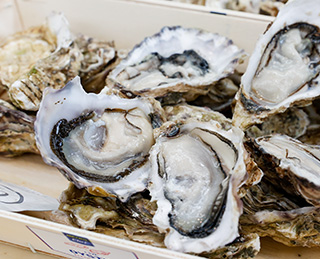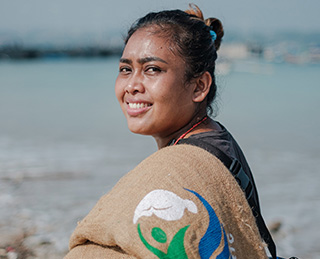METRO is focused on identifying and addressing current and future challenges of its customers in a constantly changing environment at an early stage and providing them with the best possible support to overcome them. In doing so, we strive not only to meet our customers’ expectations, but also to position METRO as their preferred partner. During the reporting period, the Covid-19 pandemic, which is still having an impact, clearly demonstrated to society, and thus also to companies like METRO, how important robust and sustainable supply chains are. It also revealed how strong the interest in more conscious consumption is among consumers, for example in terms of origin, local sourcing, healthy products and more sustainable packaging options. It is also against this background that our customer relationships are evolving from transactional merchandise trading to sustainable and holistic partnerships.
Responsible procurement and a more sustainable product range
Our assortment – especially that of our own brands – is a strong lever to achieve a positive impact in terms of more sustainable consumption. In a continuous transformation process, we are expanding our assortment of sustainable, local and healthy products for our customers to meet their expectations. At the same time, we help them differentiate themselves from competitors, strengthen local economies and influence our supply chains by raising our ambition to meet environmental and social standards1. We are committed to collective action that strengthens systemic approaches, for example to address excessive deforestation, forest degradation and conversion in key commodity supply chains, by working with external partners such as the Tropical Forest Alliance (TFA) of the World Economic Forum, the Roundtable on Responsible Soy Association (RTRS), the Retailer Cocoa Collaboration (RCC) and the Roundtable on Sustainable Palm Oil (RSPO). Furthermore, we are committed to the Cerrado Manifesto through our declaration of support and through the use of certification schemes such as the Forest Stewardship Council (FSC) or the Programme for the Endorsement of Forest Certification (PEFC). Through these networks, best practices can be shared and greater transparency of supply chains is supported. We achieve great leverage through our collaboration with the Consumer Goods Forum’s Forest Positive Coalition of Action (CGF FPC). We participate in the CGF FPC to pool our collective reach and knowledge as well as global networks and resources and to work with producers, suppliers and traders as well as governments and non-governmental organisations to advocate for forest-friendly solutions. For palm oil, soy, beef, paper and timber, dedicated task forces have published action plans with performance indicators on which they act and report. Through CGF FPC, we are also engaged in 2 landscape conservation initiatives: Low Carbon Regenerative Agricultural Production Systems in the Cerrado Biome, Brazil, with Conservation International; and Stopping Deforestation and Promoting Sustainability in West Kalimantan, Indonesia, with Rainforest Alliance. The collaboration with CGF – in particular the soy task force – also helps us manage risks, for example, by avoiding sourcing raw materials from areas considered high risk in terms of excessive deforestation. For example, in the CGF soy task force, South America was classified as a ‘risk area’. Accordingly, our soy procurement guidelines state that we are working on making sure that soy from South America is either not permitted by financial year 2024/25 or must be sustainably certified. METRO’s sustainable paper and palm oil procurement guidelines require us to use sustainably certified raw material for our own brand products by the end of financial year 2022/23, regardless of a ‘regional risk classification’. In addition, (especially in the absence of sustainably certified alternatives) we work on the ground with local parties and other stakeholders in the supply chain, for example, to end excessive deforestation. Furthermore, we are reinforcing our existing compliance and control mechanisms to ensure that products are traceable and certified in line with our purchasing requirements.
We systematically establish group-wide requirements to provide the relevant internal and external parties with guidelines for sustainable supply chain and procurement management – from responsible sourcing strategies to building a more sustainable assortment. Therefore, METRO works in line with the sustainable procurement policy, which describes the overall approach, as well as with merchandise-specific policies, for example for fish, soya, palm oil, meat, animal welfare, paper and wood. Each policy contains corresponding targets, such as ensuring that 90% of the 12 main fish and seafood species in own-brand products are sustainably sourced by 2025, which must be demonstrated in the form of a sustainability certificate or a development project.
The guidelines are developed jointly and cross-functionally by experts from the CR team at METRO AG, departments (for example Quality Assurance and Procurement), as well as experts from METRO’s national subsidiaries and external experts through stakeholder involvement. Our approach to responsible sourcing and a more sustainable product assortment, including all related policies and targets, is approved by the METRO Sustainability Committee and published on the METRO AG website. Quarterly progress updates are provided to the Sustainability Committee to guide implementation by METRO’s operational functions.
During the reporting period, 4 training courses on sustainable certification systems as well as 6 policy seminars and 4 reporting training sessions with a total of 1,1202 participants were conducted throughout the METRO organisation. The goal was to once again consolidate the knowledge of certification systems as well as the implementation specifications of all policies group-wide and to correspondingly introduce them to new colleagues. Through process optimisation efforts, EFS has also started to revise its Common Sourcing Brand Book for Wine, which aims to promote organic wines and will include requirements related to social and packaging aspects. These requirements will be incorporated into the tender process for suppliers of own-brand products. The new own brand wine book will be incepted in the course of 2023. While the packaging requirements are set out in a separate packaging requirements profile, a sustainability requirements profile for the tender process was already developed for all other own-brand suppliers beyond EFS suppliers during the 2020/21 reporting period. The profile takes into account environmental sustainability aspects of our procurement policy3.
In order to facilitate better data and target management, METRO further improved the IT system landscape during the reporting period: In particular, MQuality, a tool used throughout the group for the development and monitoring of own-brand products with an initial focus on quality management aspects, was expanded to include sustainability requirements4 such as the ability to record sustainability certificates.
Healthy and nutritious products
As part of METRO’s overall strategy to offer more sustainable products, the goal is to enable customers to make a positive environmental impact and healthier food choices for their businesses by offering more reformulated (e.g. low-sugar, low-salt or low-fat foods), ultra-fresh, organic and alternative protein products. In doing so, we strive to meet the expectations of our customers and incorporate the insights gained from stakeholder communication and market research on consumer demands for healthy food. The focus is on our own-brand products. Clear and easily accessible information about nutrients and ingredients on the product, in the store or on the national subsidiary’s website is of paramount importance to educate our customers about healthy alternatives and thus promote healthy and more sustainable consumption. For example, special logos in brochures of METRO Croatia indicate reformulated products and thus support the purchase decision. METRO Bulgaria uses social media to inform potential customers about vegetarian nutrition and suitable own brands. This trend of increasing customer and consumer demand for healthier food continued to gain momentum in financial year 2021/22, as the ongoing impact of the Covid-19 pandemic continued to raise awareness of more conscious eating, health and sustainable consumption.
As outlined in our Health and Nutrition Policy, our goal is to offer our customers a total of 1,500 healthier own-brand products worldwide (150 from central sourcing and 1,350 from national subsidiaries) by the end of 2023; some will contain less sugar, salt and fat, and some will be additive-free and certified organic or based on alternative proteins. Special health and nutrition ambassadors have been appointed in all national subsidiaries to support achievement of these goals. Since 2018 and until the end of financial year 2021/22, 787 METRO own-brand products have been reformulated in terms of their sugar, salt and fat content and to make sure they are free of additives. Furthermore, 519 organic own-brand products and 39 alternative protein-based products have been introduced since 2018.
Packaging and plastics
We support the recovery of resources through recycling to mitigate the risk of future depletion of natural resources and loss of biodiversity. Therefore, especially for our own-brand packaging, we strive to reduce the environmental impact throughout a product’s life cycle, including by seeking alternatives to traditional plastics. Given the complexity of the challenge of reducing the amount of plastic used and defining sustainable materials, we work with various stakeholders to develop innovative solutions that promote closing loops and using less environmentally harmful materials.
METRO has set goals to be completed by 30 September 2023:
- to keep all own-brand packaging 100% free of PVC (PVdC) and EPS at all packaging levels,
- to certify all primary and secondary packaging made of paper/cardboard/wood of our own brands as defined by FSC or PEFC or to ensure a recycling proportion of at least 70%, and
- to reduce plastic packaging (new and recycled) by a total of 2,000 tonnes, starting in 2018.
An expert team of packaging specialists from METRO AG and – since 2018 – a project team from 18 national subsidiaries and 3 trading offices are collaborating to achieve these goals.
Furthermore, METRO has committed to replacing conventional disposable plastic products with reusable, recyclable or compostable alternatives by the end of 2025.
In addition, METRO has launched the METRO Plastic Initiative together with the social enterprise Plastic Bank and numerous own-brand and brand suppliers. In order to reduce the consumption of valuable resources and to put the closed-loop economy principle into practice, the initiative aims to raise awareness of sustainable packaging, promote sustainable consumption as well as environmentally friendly recycling. The core concept is based on plastic bottles being collected as a concise example of plastic waste pollution before they enter the oceans as litter. METRO and its suppliers enable the implementation of this concept through a financial contribution. METRO uses a ‘bottle counter’ on its website to illustrate that the partnership has already collected more than 80 million plastic bottles since the campaign began in June 2021. Using a conversion factor of 50 bottles to 1 kg of plastic waste, this equates to a total of around 1.6 million kg of plastic waste collected.
1 For the METRO AG holding company, the aspects of responsible procurement and more sustainable product assortment, packaging and plastics as well as healthy and nutritious products are not material according to § 289c of the German Commercial Code (HGB) due to its business orientation, but rather only for its operating units.
2 It was possible for individuals to participate multiple times.
3 It includes fish and seafood, palm oil, soya, cage-free eggs, paper and wood, and disposable plastics, but excludes meat and animal welfare, health and nutrition, packaging, and social compliance.
4 There is a separate section within MQuality for packaging; a separate section for health and nutrition information is in preparation.







